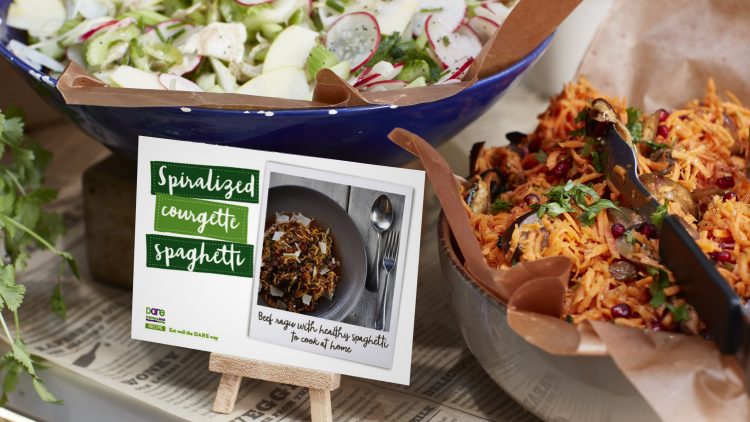
With more than 60,000 people signing up to Veganuary in 2017, up 260% on 2016, it’s safe to say that the vegan movement is becoming a real force to be reckoned with.
Figures from Google cite a 90% increase in ‘vegan’ searches. The global plant-based milk market is set to reach $21.6bn (£16.3bn) by 2022 and in the last year the UK has seen plant-based sales increase by a staggering 1500%. And a recent Mintel study found that a third of respondents are actively choosing to eat less meat.
It is clear that veganism is gathering pace and the idea that it is a ‘trend’ that will pass is no longer plausible.
So what does this mean for caterers and their clients? A plant-based diet chimes with customers’ and clients’ ever-present health and wellness priorities. And it provides significant opportunities for companies to ensure their workplace facilities cater for this growing army of meat and dairy free individuals and the reason to do so extends far beyond satisfying a burgeoning appetite for vegan food.
From recycling our household rubbish to cycling to work, we’re all aware of ways to live a greener life. With sustainability in mind, a diet that doesn’t contain animal products produces a lower carbon footprint.
The health argument is a compelling place to start. Systematic reviews suggest that those on vegetarian and vegan diets are less likely to be obese and more likely to have healthy blood pressure and cholesterol levels.
A 2010 study by Oxford University’s department of public health found that eating meat no more than three times a week could prevent 31,000 deaths from heart disease, 9,000 deaths from cancer and 5,000 deaths from stroke, as well as save the NHS £1.2bn in costs each year.
And according to researchers at the Mayo Clinic, people on a vegetarian diet for more than 17 years enjoyed a 3.6-year increase in life expectancy. These are serious numbers.
But not all plant-based diets are equal.
Recent research by the Journal of American College of Cardiology found that people who live on vegan diets comprising refined grains, potatoes and sweets had an increased risk of heart disease compared with those on regular diets. Those on healthier vegan diets, following the kind of intake recommended by nutritionists, enjoyed a comparatively lower risk.
And it’s worth noting that vegetarians and vegans are often found to be more health-conscious in general. They might drink and smoke less and exercise more than those on other diets and calculating the relative contributions of these influences can be challenging.
Within our business we believe the answer lies in providing balance and choice, as well as information through initiatives such as our DARE (Delicious And Responsible Eating) programme and a recently launched vegan, vegetarian and Gluten free range.
DARE arms customers with the tools they need to make informed eating decisions and the options to cater for all their tastes.
What is good for our customers is good for our clients because a healthy person is a healthy, productive employee. And a healthy workforce reduces absenteeism while increasing productivity and engagement.
When the Physicians Committee for Responsible Medicine, a US not-for-profit organisation, carried out a study with employees at Washington DC firm Geico, the results were eye-opening.
Participants dropped an average of 10 pounds in weight and lowered their cholesterol by 13 points. They also reported increases in overall productivity and saw improvements in anxiety, depression, fatigue and general health compared with workers at five other Geico locations in the study.
Steadfast cynics might argue that the first barrier to moving to a vegan or other specific diet is cost. Specialist foods are sometimes deemed to be too expensive and only reserved for those who can afford to be selective over what they eat. But with vegan food, that doesn’t have to be the case.
Menu planning for many chefs was historically based on proteins. Now, through rigorous training offered by Pete Redman, our chef director, we encourage our chefs to look at it the other way around and start with seasonal vegetables. Not only is that when they are at their best and most abundant, it’s usually when they’re at their cheapest too. Pete’s team uses culinary techniques that amplify vegetables’ flavour from chargrilling to umami bombs.
And they tend to complement each other brilliantly, meaning our well-trained chefs can create delicious and exciting dishes that cater to a vegan diet without the need to buy costly substitute meat ingredients.
A meatless diet has been found to be cheaper in general – by £570 a year, according to research by the Journal of Hunger & Environmental Nutrition – and it also provides more of the fruits, vegetables and whole grains that are generally considered to be integral to a healthy diet.
As a business, it makes sense to give customers the option. We are also looking at the language we use, ‘Meat-free’ gives the impression that customers are missing out, while ‘healthy’ conjures up feelings that it might not be as tasty. Using positive, indulgent language that emphasises taste and flavour is much more effective.
Now, there is a danger of sounding too preachy. There are plenty of other studies and pieces of research which point resoundingly to the fact that having a meat or dairy free diet is counterproductive to a healthy lifestyle. As a caterer, it’s important that we offer choice.
Ultimately, organisations will see an uplift in productivity if they have more engaged employees. And engagement, as we know, comes through offering employees support and choice.
That’s why progressive companies will take a close look at their catering to see where and how it can enhance their core business. As we know, there are few barriers. By working closely with suppliers, caterers can make sure they receive the right produce, at the right time, at the right price. Throw in some excellent training for chefs, and you have a great platform to offer more choice to customers and clients.
Even if providing vegan options gives some employees a 1% uplift in productivity, this could make all the difference in an ever-increasing competitive commercial environment.
An edited version of this article first appeared in FM World, December 2017. You can read this article here
Share on:
Marketing Director
More from Lin Dickens